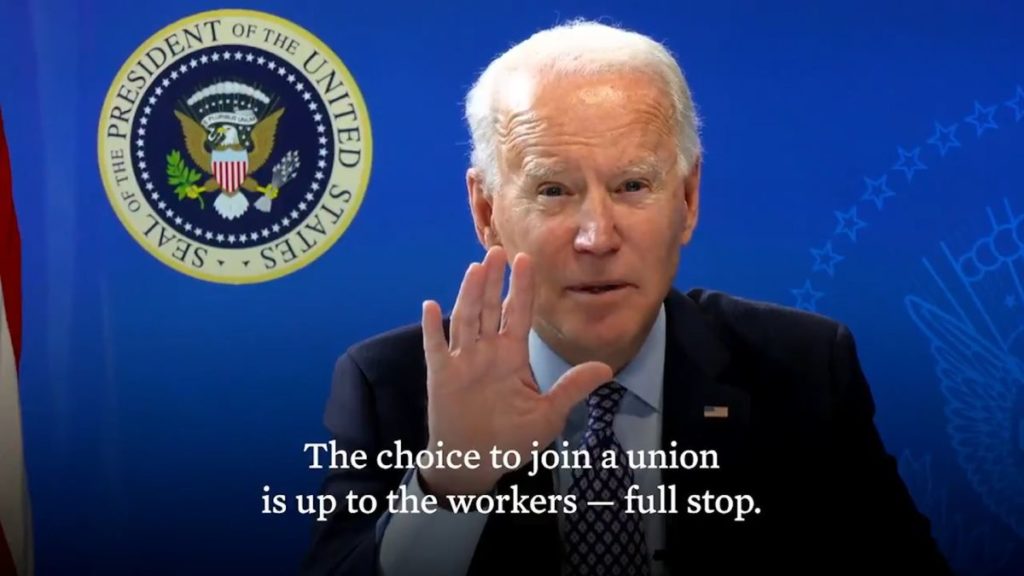Biden and Unions Revisited

Wonkette asked me to write up a case for Biden being the best president for unions. I don’t quite want to go that far–it’s still early–but there is a case to be made. At the minimum, around transportation issues, Biden stepping in on the side of the workers is not quite unprecedented, but is unusual and very much part of the case for the point.
This all leads to another question: How many presidents would have done what Biden did? The answer is, I think, very few. Many of the major strikes in our history have revolved around transportation networks. Because transportation workers have the ability to shut down large parts of the economy in the way a teachers’ strike or nurses’ strike or grocery store strike does not, they tend to lead to more presidential intervention.
The difference between Biden and most other presidents, though, is that through most of American history, the actions of presidents have been to just crush the union. In 1877, railroads forced workers out on strike in West Virginia after reducing pay for the second time in a year; soon the Great Railroad Strike swept the nation as a general protest against the dominance of the railroads over the lives of Americans — polluting them, killing them on the job and in the cities, dominating the economy through corruption, laying them off. President Rutherford B. Hayes sent the military to crush it, turning a nonviolent strike into a bloodbath.
In 1894, the Grover Cleveland administration did much the same with the Pullman Strike. In this case, Eugene Debs’s American Railway Union issued a boycott of the railroads in solidarity with workers striking in the railway car company town of Pullman, Illinois. The Attorney General, Richard Olney, was himself a railroad lawyer who illegally continued his railroad work while serving as the nation’s chief law enforcement officer. Not surprisingly, Olney convinced Cleveland to once again send in the military to crush the union and kill strikers. Debs was jailed and converted to socialism while in prison, shocked that the nation had so failed its founding principles when it came to workers’ rights.
More recently, Ronald Reagan responded to the air traffic controllers strike in 1981 by firing all the workers. It is true enough that this strike was illegal, and the controllers are no heroes of labor. They expressed no solidarity with all the other airline workers thrown out of work due to their strike. They wanted to strike and they did, consequences be damned. But Reagan had many options besides just firing them all. This terrible moment, the greatest disaster in American labor history, ended a tumultuous decade of American labor activism. Strikes plummeted and the private sector quickly learned the message that they could fire all their union workers too.
At times, though, presidents who did not even like organized labor have acted on the side of workers to get the economy up and moving. This was the case in 2002 when George W. Bush intervened in a lockout against the longshoremen on the West Coast by forcing the companies back to the table. While Bush had no love of the longshoremen or unions in general, there were more important things at play here for him — the economy, the war on terror. So workers do have a lot of leverage in these situations, if they can get the politicians to treat them as legitimate actors and not unions to be destroyed.
The overall history makes Biden look pretty good. But I think there’s one additional point to be made here. The rail unions are notoriously conservative and have been for over a century. Biden didn’t do this because he necessarily expected the rail unions to repay Democrats in the fall. This is MAGA union country, and for a lot of rail workers, listening to their NRA propaganda means a heck of a lot more than anything Joe Biden does. Some might vote against the agreement just because they hate Biden so much.
No, Biden did this because he believes in union power, even if those unions don’t necessarily support him. That’s been at the core of Biden’s actions toward unions through his entire presidency. That’s what motivated him to engage in an unprecedented intervention in the 2021 Amazon election in Alabama by sending a public message reminding that workers have the choice for a union and calling out Amazon by name. That’s what has motivated him to empower Walsh and Vice President Kamala Harris to chair a taskforce to see how the administration can increase union power through executive action, which is necessary given the hostility of Congress and rightwing courts.
Is Joe Biden the best president unions have ever had? It’s a bit early to make such claims. But the competition is very limited. He might be. That is worth noting, both to remind ourselves just how hostile the federal government has been toward unions — this very much includes recent Democratic presidents, especially Jimmy Carter and Bill Clinton, but also Barack Obama to some extent as well — and just how important Biden finds unions to rebuilding the working class in America.
The obvious case against this is that unions haven’t accomplished nearly as much as they did under FDR. But even if you ignore all the context and Roosevelt’s actual actions toward unions when under pressure by them, which doesn’t look as heroic as we might like, it’s hard to make the case that any other president has been more pro-union than Biden. I don’t think you can make a case for Truman or LBJ and I really don’t know who else you possibly could make a case for. Low bar, sure.


